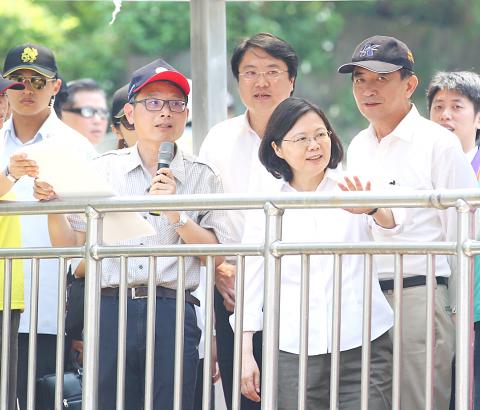The Executive Yuan’s proposed budget for the so-called “development of aquatic environments” project of the Forward-looking Infrastructure Development Program is “clearly insufficient” and would likely hamper efforts to prevent floods, Chinese Nationalist Party (KMT) lawmakers said yesterday.
The Cabinet introduced the aquatic environments program to facilitate the nation’s water distribution and improve drainage systems in flood-prone areas, and has planned a NT$250.7 billion (US$8.33 billion) budget out of the NT$890 billion earmarked for the infrastructure project.
KMT Legislator-at-large William Tseng (曾銘宗) said two of the three project objectives outlined by President Tsai Ing-wen’s (蔡英文) administration — ensuring steady water supplies and preventing flooding — would cost more than NT$220 billion, but the administration has not yet laid out any plans to assess the viability of the objectives.

Photo: CNA
He panned the administration for designating 43 areas as “highlights” for the program without informing the public how it intends to attain its goals, calling the move “dangerous.”
Flood prevention and stable water distribution affect people’s livelihoods and the Tsai administration should address the issues with prudence rather than advertising them as “highlights” of its governance, Tseng said.
Another plan to build waterfront parks, which would cost about NT$28 billion, is “not directly related to people’s safety” and should therefore be put on hold so the money could be used for water supply stabilization and flood prevention, he said.
The planned budget allocated for flood prevention is clearly insufficient, KMT Legislator Apollo Chen (陳學聖) said, adding that the proposed projects do not address local governments’ flood prevention needs.
The Water Resources Agency plans to solve flooding in a 200km2 area, which is not enough, Chen said, citing Taoyuan’s Jhongli (中壢) and Gueishan (龜山) industrial zones as examples, which he said have long been neglected by the central government and have been excluded from the forward-looking project.
“Do not expect a quick solution to problems when formulating a plan,” KMT Legislator Wang Hui-mei (王惠美) said.
“The Tsai administration has neglected issues of illegal lumbering and building development in catchment areas, and instead proposes to spend large sums on dredging reservoirs,” Wang said.
“But how do we rid reservoirs of sediment without first stepping up efforts to protect river heads? How would water shortages be solved?” Wang added.
Instead of spending money on building waterfront parks, the government should address leakages during the water distribution process, as about 10 reservoirs worth of water is lost through leaking pipes every year, she said.

Chinese Nationalist Party (KMT) Chairman Eric Chu (朱立倫), spokeswoman Yang Chih-yu (楊智伃) and Legislator Hsieh Lung-chieh (謝龍介) would be summoned by police for questioning for leading an illegal assembly on Thursday evening last week, Minister of the Interior Liu Shyh-fang (劉世芳) said today. The three KMT officials led an assembly outside the Taipei City Prosecutors’ Office, a restricted area where public assembly is not allowed, protesting the questioning of several KMT staff and searches of KMT headquarters and offices in a recall petition forgery case. Chu, Yang and Hsieh are all suspected of contravening the Assembly and Parade Act (集會遊行法) by holding

PRAISE: Japanese visitor Takashi Kubota said the Taiwanese temple architecture images showcased in the AI Art Gallery were the most impressive displays he saw Taiwan does not have an official pavilion at the World Expo in Osaka, Japan, because of its diplomatic predicament, but the government-backed Tech World pavilion is drawing interest with its unique recreations of works by Taiwanese artists. The pavilion features an artificial intelligence (AI)-based art gallery showcasing works of famous Taiwanese artists from the Japanese colonial period using innovative technologies. Among its main simulated displays are Eastern gouache paintings by Chen Chin (陳進), Lin Yu-shan (林玉山) and Kuo Hsueh-hu (郭雪湖), who were the three young Taiwanese painters selected for the East Asian Painting exhibition in 1927. Gouache is a water-based

Taiwan would welcome the return of Honduras as a diplomatic ally if its next president decides to make such a move, Minister of Foreign Affairs Lin Chia-lung (林佳龍) said yesterday. “Of course, we would welcome Honduras if they want to restore diplomatic ties with Taiwan after their elections,” Lin said at a meeting of the legislature’s Foreign Affairs and National Defense Committee, when asked to comment on statements made by two of the three Honduran presidential candidates during the presidential campaign in the Central American country. Taiwan is paying close attention to the region as a whole in the wake of a

OFF-TARGET: More than 30,000 participants were expected to take part in the Games next month, but only 6,550 foreign and 19,400 Taiwanese athletes have registered Taipei city councilors yesterday blasted the organizers of next month’s World Masters Games over sudden timetable and venue changes, which they said have caused thousands of participants to back out of the international sporting event, among other organizational issues. They also cited visa delays and political interference by China as reasons many foreign athletes are requesting refunds for the event, to be held from May 17 to 30. Jointly organized by the Taipei and New Taipei City governments, the games have been rocked by numerous controversies since preparations began in 2020. Taipei City Councilor Lin Yen-feng (林延鳳) said yesterday that new measures by